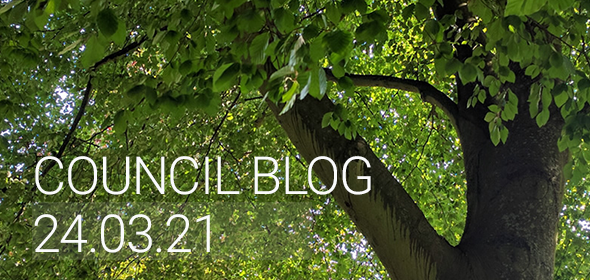Author: Philip Greenish, Chair of Council
Please note: information in this blog was accurate at the time of the meeting – 24 March 2021 – and may now have been superseded.

Council has held two meetings since I last reported. Our normal scheduled meeting was on 24 March, but we had also met on 17 February to debate and provide advice to the executive team on our estates and infrastructure plans. We again met via Microsoft Teams.
Our February meeting started with a comprehensive presentation from Professor Rachel Mills, Dean of Environmental and Life Sciences, in her capacity as Chair of the Estates Programme Board. We discussed progress made on the estate in the last year and considered carefully the lessons learned during the COVID pandemic, including on blended learning, which will have an impact on our investment plans for both our physical infrastructure and our digital environment. We considered timelines and key decision points when Council decisions will be required. We agreed that, while some investment decisions can be made quickly, others will require progress on the new strategy to give us greater clarity on the anticipated future size and shape of the University. We approved the establishment of a new Estates and Infrastructure sub-committee of Council. Finally, we discussed issues and suggestions around three development concepts and provided the executive with a long list of points for further consideration. It was a most useful meeting, superbly led and facilitated by the University team.
At the Council meeting on 24 March, I started by briefing the meeting on the main issues raised by Council members in 1-1 meetings held in February which fell into two main areas of strategy and Council conduct. Strategic issues are now being considered within the development of the new University strategy and we have set up a task and finish group to review how we can make further improvements to our processes. It will report to Council in May.
The Vice-Chancellor, Mark E. Smith, presented his report which, as usual, supplements his monthly written update to Council. He highlighted in particular: freedom of speech and the responsibilities on universities and student unions; the phased return of students to campus; summer 2021 A levels and implications for entry; the Spring Budget and a forward look to the Comprehensive Spending Review in the autumn; recent ODA funding reductions and Horizon Europe funding; the USS pension valuation; and the timeline for the implementation of the University strategy.
Olivia Reed, President of the Students’ Union, then presented her report. She included the considerable amount of activity that has taken place despite the lockdown, as well as communications with the Government from many unions, including our own, on tuition fee rebates. We discussed the implications of current events for student mental health and graduate prospects, as well as the impact on clubs and societies and the missed opportunities for students through their lack of participation. We also discussed the challenge of recovering costs for unused accommodation from non-university landlords. Council understands just how difficult this year has been for our students.
This is the time of year when Council approves the University Economy Model (UEM). We considered a report from Sarah Pook, Executive Director of Finance, which provides a 5-year financial projection and is the basis for business planning as well as submissions to the Office for Students (OfS) and to Moody’s for our annual credit rating. There are, of course, a great many uncertainties and risks but the UEM provides a basis on which to plan. We concluded by approving the UEM and the recommendations to increase funding for digital/IT enhancements.
Council had discussed criteria for our international competitor set at the Awayday in January and we have now approved the final version. This will be used mainly for benchmarking our performance but also for garnering ideas from other universities which have many similarities. We then considered our performance against the Bridging Strategy KPIs using data provided in dashboard form. We are meeting expectations in most areas, so we spent time understanding the issues on those KPIs where we are below target. Unsurprisingly, given the circumstances, these included student satisfaction.
Council then considered a number of appointments to Council. We approved two new lay members, Baroness Verma and Mr Akshay Thakur, who will join in August. Stephen Young will take over as University Treasurer from Dr David Price who will leave Council after some 12 years. Bill Shannon has been reappointed for an additional academic year, renewable, and will chair the new Estates and Infrastructure Committee. At this point in the meeting, the Vice-Chair of Council, Dame Judith Macgregor and I absented ourselves and, in our absence, Council agreed to our reappointment for a second, and final, three-year term.
In remaining business, we reappointed Deloitte as our external auditor, we approved the final budget for 2020/21; we considered and noted the Annual Research Integrity Statement; and we received a final report on our Research Excellence Framework (REF) submission. We have seen the huge amount of high-quality work that has gone into our REF submission over the last five or more years and Council has recorded its thanks to the many people who have been involved.